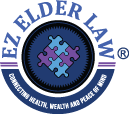The goal is to avoid bad outcomes and if you succeed at avoiding bad outcomes, there should be no litigation. However, sometimes residents are victims of negligence, neglect or intentional wrongdoing. If you think you or a loved one was injured in a nursing home, EzElderLaw can put you in touch with an attorney who will evaluate your case. When examining your case, the litigation attorney will be looking at the following:
- What’s the resident/patient like? Are they good people (or would a jury hate them)
- Family: Are they good people (do they make good witnesses or would a jury hate them)
- Duty and breach of duty (did the nursing home have a responsibility to do or not do something, and did the nursing home breach that duty?)
- Causation
- Damages
Some litigators explain injury claims in simple terms by using the acronym “POP”
- Is it predictable,
- Is it observable?
- If so, then it’s usually preventable.
- And if it’s preventable, then it should have been prevented.
Resources:
- Litigation – Anatomy of a Lawsuit
- Elder Abuse in Residential Long-Term Care Settings: What Is Known and What Information Is Needed (Article at NBCI)
- Health Advocacy (Article at Wikipedia)
- Brief of Amicus Curiae AARP In Support of Appellant in Williams v. Penn Center for Rehabilitation and Care, Superior Court of Pennsylvania, No. 1167 EDA 2014 (5/22/2015)
- Nursing Home Inspect (ProPublica)
- Podcast: Nursing Home Neglect: Preventing It and Getting Help (2/10/2022) (Other podcast episodes)
- 8 Tips to Avoid Being Sued in the Nursing Home: Attorneys Offer Expert Insight on Improving Care and Avoiding Lawsuits
- Aging out Arbitration for Wrongful Death Suits in Nursing Homes, 20 Pepp. Disp. Resol. L.J. 42 (2020)
- Perceived patient safety culture in nursing homes associated with “Nursing Home Compare” performance indicators
BLOG POSTS (Use the search feature to find additional posts)
CMS Announces Nursing Home Minimum Staffing Rule
On April 22, 2024, the Centers for Medicare and Medicaid Services announced a new final rule requiring minimum staffing levels in nursing homes. The new rule applies to all nursing homes that receive funds from Medicare or Medicaid. Nursing homes must provide at least 3.48 hours of care per resident per day. This consists of […]
Washington Post Reports Assisted Living Facilities Using Algorithm to Set Staffing Levels
On April 1, 2024, the Washington Post published an article titled “Algorithms guide senior home staffing. Managers say care is suffering.” The article indicates that a system, called Service Alignment, was developed more than two decades ago when assisted living facility (ALF) executives began timing caregivers performing tasks. That data was fed into a computer […]
Georgia Court of Appeals Revisits the Preponderance-of-the-Evidence Standard
In White v. Stanley (Georgia Ct. App. 10/3/2023), Rhonda White appealed a jury verdict in favor of the defendants relating to a motor vehicle collision. White argued that the trial court gave an improper jury instruction regarding the Preponderance-of-the-Evidence Standard. The trial court instructed the jury using the existing pattern jury instructions. However, the law […]

Opting Out of Arbitration Agreements
Ideally, health care providers do the right thing. Good Care is provided. There is no negligence. But what if they don’t do the right thing? What if they are negligent? Should you have the right to consider your options regarding how to hold them accountable? Over the past two decades, many long-term care providers, especially […]

CMS Oversight of Nursing Home Staffing Levels
Nursing homes are intended to be places of comfort and healing. More than 1.4 million individuals live in over 15,500 Medicare- and Medicaid-certified nursing homes across the nation. Everyone knows staffing is the most significant issue when determining whether your loved one gets the care he or she needs. Staffing levels have a direct impact […]

The Plaintiff’s Injury Case
There are many types of “Plaintiff’s cases.” This article focuses on injury cases. Injury cases can be as simple as a car wreck or as complex as a medical malpractice case. Regardless, they generally require four essential elements: duty, breach of duty, causation, and damages. See Calhoun First Nat’l Bank v. Dickens, 264 Ga. 285 […]

Resident’s Right to Choose Activities and Interact with Others Inside and Outside the Nursing Home
Nursing home residents have the right to who they will spend time with and how they will spend it. Specifically, 42 C.F.R. § 483.10(f)(1) – (3), (8) provides that residents have the right to and the facility must promote and facilitate resident self-determination through support of resident choice, including but not limited to the rights […]

Resident’s Right to Refuse Unnecessary Intra-facility Transfers
Nursing home residents have a right to refuse unnecessary transfers within the facility. Specifically, 42 C.F.R. § 483.10(e)(7) and (8) provides that the resident has a right to be treated with respect and dignity, including: (7) The right to refuse to transfer to another room in the facility, if the purpose of the transfer is: […]

Resident’s Right to Share a Room; Roommates
Nursing home residents have a right to share a room with whomever they wish as long as both residents agree. Specifically, 42 C.F.R. § 483.10(e)(4) – (6) provides that the resident has a right to be treated with respect and dignity, including: (4) The right to share a room with his or her spouse when […]

Resident’s Right to Reasonable Accomodation of Needs and Preferences
Nursing home residents have a right to reasonable accomodation of needs and preferences. 42 C.F.R. § 483.10(e)(3) provides that the resident has a right to be treated with respect and dignity, including: (3) The right to reside and receive services in the facility with reasonable accommodation of resident needs and preferences except when to do so […]

